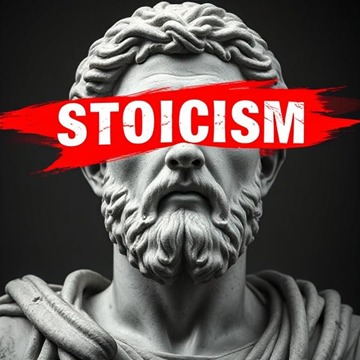
Imagine being stranded far from home, with no money or possessions. Such a predicament would make many people despair and curse their misfortune, but for Zeno of Cyprus, it became the foundation of his life’s work and legacy. The once wealthy merchant lost everything when he was shipwrecked in Athens around 300 BCE. With not much else to do, he wandered into a bookshop where he became intrigued by Socrates’ teachings. He then proceeded to seek out and study with the city’s noted philosophers. As Zeno began educating his own students, he originated one of history’s most influential schools of thought: Stoicism. Today, we colloquially use the word “stoic” to mean someone who remains calm under pressure and avoids emotional extremes. While this captures important aspects of Stoicism, the original philosophy was more than just an attitude.
Stoicism was named after the Stoa Poikile, the decorated public colonnade where Zeno and his disciples gathered for discussion. The Stoics believed that everything around us operates according to a web of cause and effect governed by 'logos': a divine rational principle that structured the universe. Rather than imagining an ideal society, the Stoics focus on dealing with the world as it is while pursuing self-improvement through four cardinal virtues:
Practical wisdom: the ability to navigate complex situations in a logical, informed, and calm manner
Temperance: the exercise of self-restraint and moderation in all aspects of life
Justice: treating others with fairness, regardless of their actions
Courage: not just in extraordinary circumstances but in facing daily challenges with clarity and integrity as Seneca, one of the most famous Roman Stoics, once wrote: “Sometimes even to live is an act of courage”.
This school of philosophy was active for several centuries in Greece and Rome. As a formal institution, it faded away, but its influence has continued to this day. Over the course of his reign, Marcus Aurelius, perhaps Stoicism’s most famous practitioner, gained the resolve to lead the Roman empire through two major wars while dealing with the loss of many of his children. Centuries later, Marcus’ personal writings in The Meditations would guide and comfort Nelson Mandela through his 27-year imprisonment. Inspired by this philosophy, Mandela stressed peace and reconciliation after his release and eventual victory. He believed that although the injustices of the past couldn't be changed, his people could confront them in the present and seek to build a fairer, more promising future.
In short, the story of Stoicism is a reminder that strength lies in one’s self-control and mastery. It is a timeless call to live with wisdom, justice, courage, and self-restraint. More importantly, it’s a challenge to find clarity in confusion and to hold your ground when the world crumbles around you. For life will test you. You will fail. You will be misunderstood, disappointed, and hurt. So, ask yourself: how might your life change if you focused not on controlling the world but rather on controlling yourself?